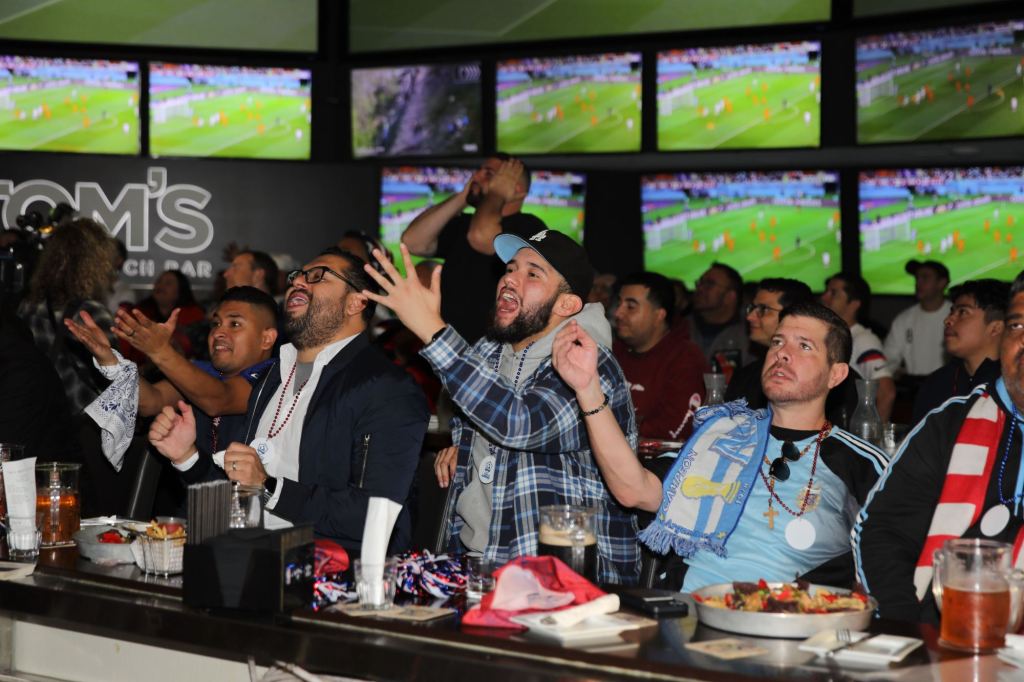
With the hospitality sector still not fully recovered from the COVID-19 pandemic, a pair of state legislators are once again pushing to help revive struggling downtowns by allowing bars and other venues to serve alcohol longer into the night. Or really, the morning.
And with California set to host several major sporting events over the next three years — including the World Cup, Super Bowl and Olympic and Paralympic Games in the Los Angeles area — tourists flocking to host cities and surrounding communities will want a bustling nightlife, they said.
AB 342 would allow cities and counties to voluntarily establish “hospitality zones” where properly licensed venues can serve alcohol until 4 a.m. on Fridays, Saturdays and state holidays.
State regulations now mandate that establishments must stop serving alcohol at 2 a.m. (The one exception is an exclusive, members-only club inside the L.A. Clippers’ Intuit Dome arena, which is allowed to serve alcohol until 4 a.m. on certain nights under a bill that Gov. Gavin Newsom signed last year.)
The latest effort was introduced by Assemblymember Matt Haney, D-San Francisco, who said in an interview that California cities must be given options to remain competitive with other cities whose vibrant nightlife draws in tourists.
This is especially critical post-pandemic, he said, when establishments that once counted on downtown workers coming in for lunch or after work have lost business since many people now work from home and have not returned to the office.
“We have to embrace more nighttime and weekend opportunities downtown. … For our cities to compete, there’s got to be a lot to do, including at night. It’s what people often are looking for,” said Haney, who chairs the Assembly Select Committee on Downtown Recovery. “California is getting in our own way by not allowing any flexibility on nighttime hours on weekends, even in places where there’s clearly a huge demand and huge opportunity.”
Under his bill, local governments that establish hospitality zones must consider public safety issues, access to transportation, proximity to hotels and arenas, walkability factors and the cultural, historic and economic appropriateness of the area.
Variations of the bill have been considered by the California Legislature for years.
Then-Gov. Jerry Brown vetoed a similar effort in 2018, citing concerns over increased drinking.
That bill, from Sen. Scott Wiener, D-San Francisco, called for a pilot program to extend the hours of alcohol sales from 2 to 4 a.m. in nine cities, including Los Angeles, Long Beach, West Hollywood, Coachella and Palm Springs.
“I believe we have enough mischief from midnight to 2 without adding two more hours of mayhem,” Brown wrote in his veto message.
Wiener introduced a similar bill again in 2022, but that version never made it out of the Assembly. Haney co-authored that bill; this time, Wiener is a co-author on his.
One Southern California lawmaker who remains “vehemently opposed” to extending “last call” hours is Assemblymember Tom Lackey, R-Palmdale.
Before retiring from the California Highway Patrol, Lackey spent 20 of his 28 years there working the early morning hours when drivers were more likely to be impaired due to alcohol consumption, drowsiness or both — the latter of which Lackey called a dangerous combination.
Over his career, Lackey issued more than 40 death notifications due to deadly driving incidents, he recounted.
Nothing should justify supporting a policy that could result in serious injury or death, he said in an interview.
“The cost is life itself or unbelievable serious injuries. … I don’t think there’s any benefit that compares to that cost,” he said about proposals to extend “last call” hours.
Haney said he discussed his legislation with the California Association of Highway Patrolmen. The association opposed a previous version of the bill but, according to Haney, is neutral this time.
The association did not immediately respond to a message seeking comment about AB 342.
Haney said his bill is different from prior versions in that the extended “last call” hours are limited to weekends and holidays and would establish hospitality zones which local governments can set and define.
He said much has changed since Brown vetoed the 2018 bill, including an increase in ride-share options for people who need to get home after a night of drinking. In addition, he said the world has changed since the pandemic, and cities are “desperately” seeking ways to reinvigorate their downtowns and support local businesses.
According to Haney’s office, several business and tourism industry groups support his bill. This includes the California Chamber of Commerce and local chambers of commerce in Los Angeles, Long Beach and Hollywood, as well as other downtown associations.
Paul Simonds, senior vice president of the Orange County Business Council, said in an email that the organization is “monitoring” the bill but hasn’t taken a position on it.
The Assembly Governmental Organization Committee will consider the bill during a hearing on April 23, according to Haney’s office.
Originally Published:



